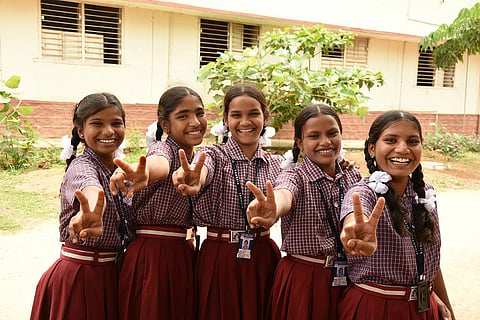

Continuing their streak of outperforming the private schools and their government counterparts, Mahatma Jyotiba Phule Telangana Backward Classes Welfare Residential Schools (MJPTBCWRS) achieved the highest pass percentage of 98.78, out of the overall state pass percentage of 92.43, in the Secondary School Certificate (SSC) examinations 2019, results of which were announced on Monday.
Out of the 980 students from BC welfare schools, 968 of them passed and 19 schools from the total of 142 schools had 100% pass results. 10 students had a perfect 10 GPA (grade average point).
Following the BC welfare schools, the Telangana Social Welfare Residential Educational Institutions (TSWREIs) scored a pass percentage of 96.63 while the Telangana Tribal Welfare Residential Educational Institutions (TTWREIs) fared with a winning streak of 95.49%. A total of 61 students in both the schools secured a 10 GPA.
It is not the first time that the SSC students from the schools have secured a better result than the rest of the state. In 2018, the BC welfare schools had a pass percentage of 96.18 %.
In the academic year 2017-18, while the average pass percentage in the state was 83.7%, the tribal welfare schools were much ahead with 90.5% of students passing the exams. In the previous academic years too, the welfare schools have consistently scored good grades compared to the rest of the state.
How do the schools manage to excel?
Speaking to TNM, Assistant Guidance Officer, P Kesavulu of MJPTBCWRS, says that the schools managed to perform this well because of their preparedness to relieve the students of exam anxiety by constantly conducting exams.
“We finish the syllabus by January and conduct three tests – five special tests, an exam and a pre-final. This helps the students overcome the fear of exams. This also helps with revision of the chapters,” he says.
Another officer, Karunakar Reddy, says, “We plan well ahead for achieving these results. In June, we conduct summer camp classes for the class 10 students on subjects like Mathematics, English and Science. This helps us to complete the portion by January, and we would concentrate on revision at least thrice.”
Karunakar Reddy attributes the success to ‘intensive testing programme,’ wherein the syllabus would be divided into small portions and tests would be conducted every day from January.
“From January there would be regular tests. During this we would assess students based on their performance. We would focus particularly on the non-performing students and help them with revision every evening,” he adds.
Connect with parents
Speaking to TNM, Venkat Raju, spokesperson of the tribal and social welfare schools, says that it’s the constant hard work of the teachers and students that helped the students get excellent grades.
"We identify students who are slow at grasping and give them extra attention. We have three programs aimed at identifying students from the tribal hamlets to bring them to the schools and creating awareness among parents on how education is important to uplift them from their current socio-economic conditions," he explains.
Under the guidance of RS Praveen Kumar, secretary of the tribal welfare schools, the institutions hold a program called 'Quest' where teachers travel to the tribal hamlets and persuade parents to send their kids to school.
"We have a second initiative called 'Impact' where we invite parents to the schools at the end of every term. We conduct discussions where students who belong to similar backgrounds and have done well talk to parents, motivating them to aspire the same for their kids," Venkat says.
The schools have introduced another program this year called ‘Hulchul’, where they conduct programs and competitions for parents.
"Through various programs, we have come to win the trust of the parents and they have realised that education is the only way through which their children can earn a name and living in the society," adds Venkat.
Proving their mettle, for the first time ever, 506 students belonging to the tribal and social welfare schools cracked the JEE Mains 2019, the results of which were declared last month. Even in the Intermediate board results that were declared recently, students of the welfare institutions surpassed the state average with a pass percentage of 84.31% as compared to the state’s average pass percentage of 64.8%.